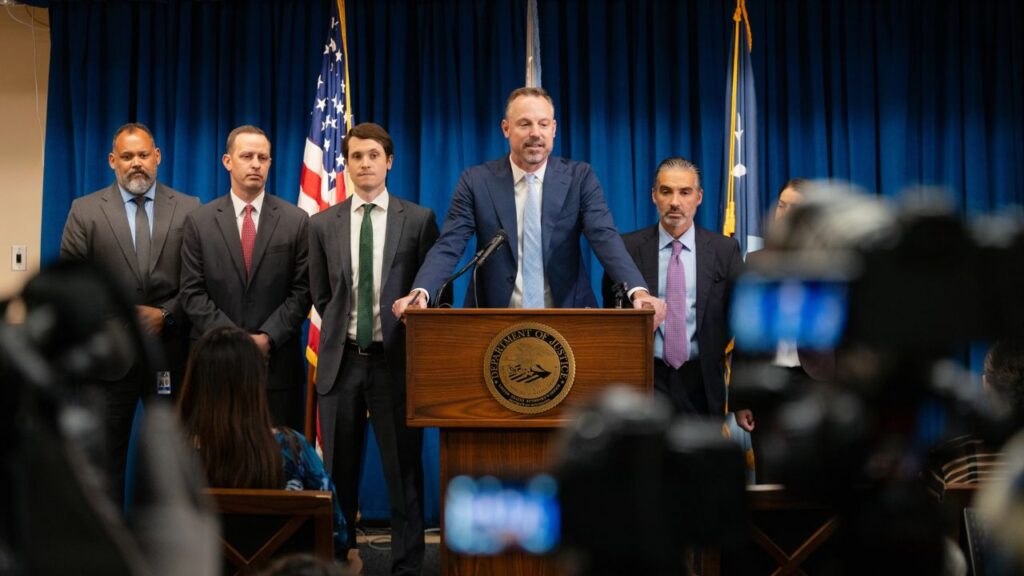Chief Justice of the United States John Roberts joins other members of the Supreme Court as they pose for a new group portrait, at the Supreme Court building in Washington, Oct. 7, 2022. Roberts has declined an invitation to meet with Democratic senators to talk about Supreme Court ethics and the controversy over flags that flew outside homes owned by Justice Samuel Alito. (AP File)

- Chief Justice Roberts, backed by Republicans, rewrote the Constitution to give the president near-total immunity from legal accountability.
- Roberts argued that prosecuting ex-presidents would harm the executive branch, but critics say this undermines the Constitution's balance of powers.
- Bouie compares this decision to the Dred Scott case, warning it could lead to significant presidential lawlessness and be one of the Supreme Court's worst rulings.
Share
|
Getting your Trinity Audio player ready...
|
Opinion by Jamelle Bouie on July 12, 2024.
The most important takeaway from the Supreme Court’s decision in Trump v. United States is that Chief Justice John Roberts, with the approval of his Republican colleagues, rewrote the Constitution to place the president above the law.

Opinion
The New York Times
The chief justice erased the Constitution’s clear contemplation of criminal charges for presidential misconduct. He conjured, out of thin air, a distinction between “official” and “unofficial” acts that can’t survive the slightest scrutiny. He cloaked the executive in a prosecutorial immunity so complete that it shields almost any act a president might take from legal accountability so long as that president could tie it to a “core” duty. He eliminated, in practice, any distinction between a lawful or unlawful exercise of presidential authority. And Roberts did this, he says, to preserve the separation of powers and the integrity of the executive branch.
Related Story: Supreme Court Stripped Federal Regulators of Power. Do California Rules Offer a ...
Presidential impunity for criminal behavior isn’t the issue, Roberts suggests. The real problem, he says, is the “more likely prospect of an executive branch that cannibalizes itself, with each successive president free to prosecute his predecessors, yet unable to boldly and fearlessly carry out his duties for fear that he may be next.”
Hand-waving away the ugly circumstances of this case — Donald Trump’s attempt to overturn his defeat in the 2020 presidential election — Roberts writes that without immunity, “prosecutions of ex-presidents could quickly become routine. The enfeebling of the presidency and our government that would result from such a cycle of factional strife is exactly what the framers intended to avoid.”
The chief justice wrote those last lines as a rebuke to his liberal colleagues who warned, in their dissents, that the majority had made the American president something like a king. But you can also read those lines as a glimpse into Roberts’s mindset. The majority’s opinion in Trump v. United States is not so much a legal decision — it is untethered from the text, structure and history of the Constitution, making claims that are, according to the legal scholar Akhil Reed Amar, “flatly contradicted by the document’s unambiguous letter and obvious spirit” — as it is a political one.
It seems that for Roberts, the criminal prosecution of Trump is so transgressive as to demand the immediate intervention of the Supreme Court. But the constitutional order does not support Roberts’ intuition that the president should have immunity for nearly every action taken in office — from Montesquieu to James Madison, separation of powers never meant that each branch was immune to the touch of the other or that executive officers were beyond the reach of legal culpability.
Related Story: Support for Legal Abortion Has Risen Since Supreme Court Eliminated ...
Rather than sit with the reality of the situation, Roberts did what he has the power to do under the status quo of judicial supremacy: impose new meaning on the Constitution according to what he wants it to say, rather than what it says. He will settle the issue of the executive’s criminal culpability, so that the president can govern with the energy and confidence Roberts thinks the president needs to succeed.
We don’t know how this opinion will play out. If Trump wins a second term, there is a real chance that it will empower presidential lawlessness of a kind that no living American has experienced, at least in this country. Trump v. United States would become, in short order, one of the worst opinions ever issued by the Supreme Court. And Roberts would take his place in infamy alongside the other man whose work as chief justice helped unravel the American Republic before the Civil War: Roger Taney.
For all of the influence and stature accorded the position of chief justice of the United States, we really remember only a small group. There’s John Marshall, who defined the scope of the court’s powers and used them to shepherd the American constitutional order through three decades of conflict and controversy, and Earl Warren, who constitutionalized the rights revolution of the 1950s and ’60s and helped establish the court as a place of recourse for the most vulnerable groups in our national community.
We ignore most of the others. Who, other than scholars, lawyers and the occasional journalist, thinks about John Jay or Salmon P. Chase or Fred M. Vinson? But Taney is one chief justice whose name is not only remembered but also inspires contempt.
Related Story: This Supreme Court Strikes Against Democracy, Again and Again
Through most of his career on the court, Taney was praised for his moderation and integrity, even as he unambiguously worked to constitutionalize Jacksonian views of state sovereignty and federal power. With his decision in the 1857 case Dred Scott v. Sandford, however, Taney began his career as one of the most hated men in America — an ideologue who used his power to impose a stunted vision of the Constitution on the entire country, at the cost of pushing sectional tensions to the point of no return.
What stands out in Dred Scott is the breadth of Taney’s opinion. Rather than deal with the narrow question of Scott’s freedom, Taney reached out beyond the scope of the issue at hand to decide broad and unasked questions of constitutional law. He passed definitive judgment on Scott’s freedom and the status of Black citizenship and the constitutionality of the Missouri Compromise and the authority of territorial legislatures to regulate slavery. As Judge Ethan Greenberg writes in his 2010 book “Dred Scott and the Dangers of a Political Court,” Taney “reached out over and over again in order to rule on questions about slavery that were not necessary to the resolution of the Dred Scott case, and that had never been raised before or considered by the court below.”
Taney did this out of a sincere and deep-rooted commitment to the slave system and the Jacksonian notion of a “white man’s republic.” To protect slavery was, to Taney and the Dred Scott majority, to defend the integrity of the Union against the agitation of abolitionists and antislavery politicians. But it was not the Supreme Court’s role to settle the slavery question or quell sectional tensions or deliver a victory to its preferred side in a partisan or ideological battle. Taney and his proslavery colleagues ignored precedent, distorted history and misread the Constitution in service to what they wanted the constitutional order to be.
Or, as Greenberg concludes, the Dred Scott court “abandoned intellectually honest legal reasoning and the disinterested application of neutral principles of law because the court wished to pursue what it believed to be noble and important political goals.”
It is the job of the courts to say what the law is. But this does not give judges the right to make binding pronouncements about any legal or political question that strikes their fancy. And it does not give the Supreme Court, in particular, the right to rewrite the Constitution for its own ends.
Roberts and the majority in Trump v. United States have novel and expansive views of executive authority. They have constitutionalized their views so that they might settle a political controversy and bring order to what they see as chaos. Like Taney and the Dred Scott court, Roberts and the Trump court are arrogant enough to think that they’ve settled the issue “for the ages.”
We know that Taney unleashed forces that neither he nor his allies could control. We can only hope that Roberts has not made the same mistake.
–
This article originally appeared in The New York Times.
c.2024 The New York Times Company



















